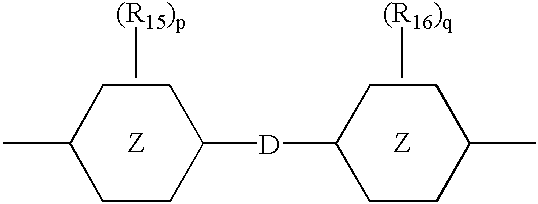Photochromic polymerizable compositions
a polymerizable composition and photochromic technology, applied in the field of photochromic compositions, can solve the problems of slow activation and fade rate of photochromic activation and solid polymer matrix, loss of color reversibility ability, and loss of color reversibility
- Summary
- Abstract
- Description
- Claims
- Application Information
AI Technical Summary
Benefits of technology
Problems solved by technology
Method used
Image
Examples
examples 1 – 14
EXAMPLES 1–14
[0150]Table 6 lists the monomers by weight percent in each of Examples 1–14. The Examples were prepared by adding the monomer composition listed in Table 6 to a suitable vessel equipped with an agitator and mixing for an hour after the following additions: FC-431 fluorocarbon surfactant available from 3M, was added in an amount to provide 0.15 weight percent and Photochromic Component of Table 5 was added in an amount to provide 28.0 weight percent, both weight percents being based on the total weight of monomers.
[0151]
TABLE 6Example #1234567891011121314BPA2EO DMA (n)4540304545457070707070707070Component 13540308.7517.526.25301501510000Component 200026.2517.58.7501530010000Component 30000000001510000TMPTMA (o)20202020202000000000BPA 10EO DMA (p)0020000000003000BPA 20EO DMA (q)000000000000300BPA 30EO DMA (r)000000000000030(n) Bisphenol A ethoxylated (1 EO / phenyl) dimethacrylate available from Sartomer, Inc.(o) Trimethylol propane trimethacrylate available from Sartomer, ...
example 15
[0152]The Accelerated Weathering Photochromic Percent Photopic Fatigue Test (AWPPPF Test) comprises preparing lenses in Parts A–C, coating the lenses with a polymerizable composition in Part D, measuring the microhardness of the coated lens (using a FISCHERSCOPE-® H-100 microhardness measuring instrument) in Part E, and determining the photochromic performance and fatigue in Part F, before and after weathering in Part G.
[0153]The polymerizable composition of the present invention was incorporated into the coating compositions of Examples 1–8, 10 and 11. Other polymerizable compositions, that did not contain the polymerizable composition of the present invention, such as the compositions of Examples 9, 12, 13 and 14 were also tested. The photochromic performance and fatigue test results for coatings having comparable microhardness levels were compared to determine if there was an increase or decrease in these parameters. By comparing coated lenses having comparable microhardness leve...
PUM
| Property | Measurement | Unit |
|---|---|---|
| temperatures | aaaaa | aaaaa |
| temperatures | aaaaa | aaaaa |
| temperature | aaaaa | aaaaa |
Abstract
Description
Claims
Application Information
 Login to View More
Login to View More - R&D
- Intellectual Property
- Life Sciences
- Materials
- Tech Scout
- Unparalleled Data Quality
- Higher Quality Content
- 60% Fewer Hallucinations
Browse by: Latest US Patents, China's latest patents, Technical Efficacy Thesaurus, Application Domain, Technology Topic, Popular Technical Reports.
© 2025 PatSnap. All rights reserved.Legal|Privacy policy|Modern Slavery Act Transparency Statement|Sitemap|About US| Contact US: help@patsnap.com



